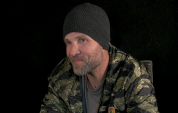23:20 | It takes a lot of heart to become a Marine but it takes even more to become a Reconnaissance Marine. To endure the rigorous physical and mental challenges means you are one of the elite. This group of Recon Marines shares their personal stories of joining the Corps and how they came to Recon during a pivotal time in history. Part 1 of 3. (Caution: strong language)
Keywords : Special Operations Special Forces (SF) Reconnaissance (Recon) boot camp School of Infantry (SOI) Indoctrination running swimming physical fitness test (PFT) physical training (PT) pipeliner Amphibious Reconnaissance School (ARS) 9-11 9/11 Darwin Australia Marine Expeditionary Unit (MEU) Pakistan Afghanistan Osama Bin-Laden

By the time he reached high school, divorce had made him withdrawn and depressed. A roommate got him thinking about the Marine Corps and he began training on his own. Soon he was in San Diego training for real at boot camp and the School of Infantry.
He was now a grunt. Jason Lilley had pulled himself out of a depressing youth and made a Marine out of himself. The attacks on 9/11 gave him and all the Marines new focus on their training. They knew they would be needed soon. He had his eyes set on a higher prize though, the Reconnaissance Marines. (Caution: strong language)
First you had to pass a tryout so you could go through the real tryout, the Basic Reconnaissance Course. Jason Lilley was determined to become a Reconnaissance Marine, probably the most elite role in the Marine Corps. The tests were brutal and he was up to the challenge.
In the Spring of 2003 Jason Lilley deployed to the Kuwait desert in preparation for Operation Iraqi Freedom. He had just joined the elite 1st Reconnaissance Battalion and he and his new buddies had trained hard for this moment. As he waited to cross the border, ordnance filled the sky, coursing into Iraq. (Caution: strong language)
It was uneventful at first. Recon Marine Jason Lilley was driving a Humvee toward Nasiriyah through beautiful countryside and Bedouin camps. When he got there, he saw the burned out vehicle that Jessica Lynch had been in. Soon he saw his first dead Marines.
In the first firefight in his first tour of Iraq, Jason Lilley faced a group of Syrians. They wore jeans and sneakers, definitely not Iraqis. He had not really heard the term Jihad before but that was why they were there. When he got back to the States, he figured the war was over. He figured wrong. (Caution: strong language)
The two deployments to Iraq were two different wars. The second time, Jason Lilley found himself in Fallujah where the enemy had reorganized and started to use IED's. It was urban fighting and he had to dodge mortar fire nearly every day. (Caution: strong language)
The routine convoy was stopped in its tracks by dozens of Jihadis. Jason Lilley was in the back and his group veered off to mount a counter-ambush. The first vehicle had been hit with an RPG and the enemy was firing from multiple locations. Captain Brent Morel led a charge straight at them while Lilley's group of Marines blasted them from the rear. For this action, he was awarded the Silver Star. (Caution: strong language)
The training is the same. The caliber of individuals is the same. Reconnaissance Marines like Jason Lilley are, for all intents and purposes, special forces just like the SEAL's. He reveals what kind of music reminds of him of his days in combat and he has a lot of appreciation for being able to reunite with his team mates. (Caution: strong language)
They thought it was over. In 2003 the men of the 1st Reconnaissance Battalion stormed into Iraq during the initial assault. They returned home triumphant, mission accomplished. But then the word came that there would be an emergency redeployment. Saddam may be gone but the job was not finished and they were going to Fallujah. Part 3 of 3. (Caution: strong language)
As Operation Iraqi Freedom unfolded, the mission of the 1st Reconnaissance Battalion was to draw out Saddam's forces and engage them while larger bodies of troops moved on Baghdad. With one Recon platoon, a journalist was embedded who turned their story into a series of articles, a book and an award winning Hollywood production named Generation Kill. Part 2 of 3. (Caution: strong language)